While dosing is unique for each individual, understanding the importance of certain key nutrients for the therapeutic use in anorexia nervosa is incredibly important and is a fundamental part in the management of such conditions.
1. Zinc
Many Western diets are commonly low in zinc and it has been proposed that even marginal zinc deficiencies may contribute to the pathogenesis and exacerbation of anorexia nervosa. Symptoms of a zinc deficiency include weight loss, loss of taste and aversion to food, particularly animal proteins, skin changes, loss of a menstrual cycle in women, depression and digestive upset. Zinc is thought to be a cofactor in almost every enzymatic reaction that occurs in the brain as well as a major contributor to the production of digestive enzymes and stomach acid – two key components for optimal digestion and nutrient absorption.
There are multiple routes of administration of zinc, from dietary sources to oral supplementation to intravenous routes. Foods highest in zinc include oysters and other types of shellfish, pumpkin seeds, beef and lamb. For those who are in need of zinc replenishment, supplementation in the form of intravenous therapy is usually the preferred choice as oral zinc supplementation can cause nausea.
2. Amino acids
It’s no surprise that a deficiency of amino acids is a concern in anorexia nervosa, with a common progression to the development of this eating disorder involving limited or no animal protein intake. Amino acids are involved in the development of muscles, cells and other tissues in the body. Most notably, they are the building blocks of neurotransmitters. Amino acids are important in many different mental health concerns and are fundamental for improving mood, decreasing distorted thinking and decreasing anxiety and obsessive thoughts. A deficiency in zinc can also exacerbate an amino acid deficiency, as digestive enzymes and stomach acid are required for the appropriate break down of proteins in the body.
Only animal-based proteins contain all of the essential amino acids the body requires although proper food combining with vegetarian foods can also provide all these essential amino acids. Supplementation with amino acids may also provide added benefit to some, in the form of oral or intravenous routes of administration.
3. Essential fatty acids (EFAs)
Did you know the brain is nearly 60% fatty tissue? We’ve learned in recent years that fatty acids are among the most crucial molecules that determine your brain’s integrity and ability to perform. Essential fatty acids are those that cannot be synthesized by the body and must be obtained through dietary sources. From visual acuity to mental development to proper immune function, EFAs are fundamental for optimal health and welling. Pertaining to eating disorders, a deficiency in EFAs can exacerbate comorbid mental health conditions, particularly depression, which can impede recovery efforts.
There multiple sources of EFA supplementation available, with fish oil being the preferred supplement choice. Just one teaspoon daily can provide an adequate therapeutic dose to help boost mood and brain function over time. While supplementation with this nutrient is important, dietary sources are also excellent in the diet. Appropriate sources include cold-water fish such as salmon, mackerel and herring and vegetarian sources such as flaxseeds and chia seeds.
The issue with anorexia nervosa recovery is the focus on weight restoration without the appropriate monitoring of nutritional repletion. This leaves patients vulnerable to chronic nutrient deficiencies and could possibly even leave for an extended recovery time or no recovery at all. Therapy is obviously incredibly important for eating disorder recovery and if the brain is not properly nourished, the challenge of working through the mentally intensive road to recovery proves a major challenge for many.
Resources
- Ayton, AK; Azaz, A; Horrobin, DF. (2004 Oct). A pilot open case series of ethyl-EPA supplementation in the treatment of anorexia nervosa. Prostaglandins Leukot Essent Fatty Acids. 71(4):205-9.
- Chang CY, KE DS, Chen JY. (2009 Dec). Essential fatty acids and human brain. Acta Neurol Taiwan. 18(4):231-41.
- Greenblatt, J. (2010). Answers to Anorexia: A Breakthrough Nutritional Treatment That Is Saving Lives. North Branch, MN: Sunrise River Press.
- Mattar, L; Thiebaud, MR; Huas, C; Cebula, C; Godart, N. (2012 Dec 30). Depression, anxiety and obsessive-compulsive symptoms in relation to nutritional status and outcome in severe anorexia nervosa. Psychiatry Res. 200(2-3):513-7.






